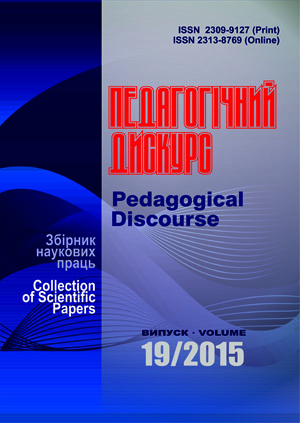Reforming Education Features in the XXI-st Century Сhallenges
Abstract
The article outlines the society features of the XXI-st century. The analysis of these features, real and anticipated trends in education reform in a global context has been fulfilled. Transition from knowledge to competence educational paradigm has been accented. Highlighted competencies are: key; general and intended. It is revealed that the common areas of change include: the introduction of new educational standards and strategies for assessing the institutions’ quality of education, upgrading curriculums (in compliance with optimal proportion between the transfer of knowledge and methodology of receipt), and priority in transmission operational rather than encyclopedic knowledge to pupils and students. The need for such learning theory able to orient education toward a new way of thinking and new stimuli for life of future generations is accented. There is a new division of responsibility for the functioning of education. It is indicated on the main goals of global education and innovative features of current reforms. Noticeable trend of institutional reform with the transition to higher autonomy of schools is underlined. A problem concerning the privatization of education is also outlined.
Downloads
References
Strategie reform oświatowych w Polsce na tle porównawczym /pod. red. I. Wojnar, A. Bogają, J. Kubina. – Warszawa: Komitet Prognoz «Polska 2000 Plus», 1999. – 248 s. / Strategies for educational reforms in Poland in a comparative / under. ed. I. Wojnar, A. Bogaj, J. Kubin. – Warsaw: Forecasting Committee «Poland 2000 Plus», 1999. – 248 p. [in Polish]
Korsak K. Osvita, suspilstvo, liudyna v XXI stolitti: integralno-filosofski analiz (Education, society, people in the XXI century: the integral-philosophical analysis), Monograph. – Kyiv, Nizhyn, 2004. – 221 p. [in Ukrainian]
Melosik Z. Edukacja globalna: nadzieje i kontrowersje // Ewolucja tożsamości pedagogiki /red. naukowa H. Kwiatkowskiej. – Warszawa, 1994. – S.165–175. / Melosik Z. Global Education: hopes and controversies // The evolution of identity pedagogy / ed. Scientific H. Kwiatkowska. – Warsaw, 1994. - pp.165–175. [in Polish]
Gnitecki J. Globalistyka. Globalizacja – wymiar społeczny // Encyklopedia Pedagogiczna XXI wieku /red. naukowy T. Pilch. – Warszawa: Wyd. Akademickie «Żak», 2003. – Tom II. – S. 47–53. / Gnitecki J. Globalistyka. Globalization – the social dimension // Pedagogical Encyclopedia twenty-first century / ed. Scientific T. Pilch. – Warsaw: Ed. Academic «Zak», 2003. – Volume II. – рр. 47–53. [in Polish]
Kupisiewicz Cz. Reforma szkolna MEN z 1998 roku na tle porównawczym //Strategie reform oświatowych w Polsce na tle porównawczym /pod red. I. Wojnar, A. Bogaja, J. Kubina. – Warszawa: ELIPSA, 1999. – S. 21–38. / Kupisiewicz Vol. The school reform Ministry of Education in 1998 in a comparative // Strategies for educational reforms in Poland in a comparative / ed. I. Wojnar, A. Bogaj, J. Kubin. – Warsaw: ELIPSA, 1999. – рр. 21–38. [in Polish]
Tchorzewski A. Uwarunkowania i kreatorzy reform edukacyjnych //Edukacja w dialogu i reformie /pod red. A. Karpińskiej. – Białystok: Trans Humana, 2002. – S.88-102. / Tchorzewski A. Conditions and creators of educational reforms // Education in dialogue and reform / ed. A. Karpińska. – Bialystok: Trans Humana, 2002. – рр.88–102. [in Polish]

















